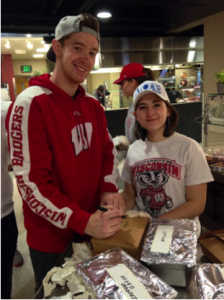Feeding fellow Badgers
How Campus Kitchens fights hunger
by Matt Davis
While eating in Gordon Dining and Event Center during her freshman year, Katherine Kokkinias noticed all the extra food Gordon’s threw out. Kokkinias knew, at this point, that she could make a difference. She thought, “Why not take all this leftover food and give it to those who may not be able to afford their next meal?”
Later in the semester, Kokkinias went to a food summit conference at Northwestern University. While there, she met Colin McReavy, another UW-Madison student with a similar idea.
The two joined forces and The Campus Kitchens Project of UW-Madison was born.
Kokkinias, now a junior, is one four students in charge of the UW-Madison chapter of The Campus Kitchens Project, a national organization on over 36 college campuses across the country that works to serve food to students who have trouble paying for their meals. Four students — Kokkinias, McReavy, Meaghan Sargent and Shruti Rajan — started UW-Madison’s chapter last spring.

McReavy (left) and Kokkinias (right) are two of the four co-founders of the UW-Madison Chapter of Campus Kitchens. (UW Campus Kitchens)
Campus Kitchens takes food from UW-Madison dining halls that would otherwise be thrown out and turns the extra food into a meal for UW-Madison students who are food insecure.
“While students might get their tuition paid for by scholarships and have a job on campus, some of the costs might still be there and students may not know where their next meal is coming from,” said Kokkinias. “These situations range from a homeless student living in a public bathroom to a student who may not get a meal one night a week.”
Kokkinias went on to mention that some students, who received scholarships that paid for most or all of their tuition, lost access to food stamps from the government, hurting their ability to buy food.
Campus Kitchens is currently based out of Rheta’s Market, a dining hall at UW-Madison. Campus Kitchens takes the extra food from Rheta’s to create meals.
Kokkinias estimates that Rheta’s has an extra 150 pounds of food each night that goes unused.
“Campus Kitchens is a great resource,” said Cathy Ness, food service administrator for housing’s dining and culinary services at UW-Madison. “I know that there are a lot of students out there that could use this food and we really want to help these needy students.”
Campus Kitchens welcomes student volunteers as well. There are three shifts: picking up food from dining halls, cooking and serving.
This semester, Campus Kitchens is collaborating with Financial Aid Security Track, a university program that supports economically disadvantaged undergraduate students. Campus Kitchens serves meals to FASTrack members at their monthly meetings.
Many of the students in FASTrack receive scholarships and are considered low-income students.
“Students don’t show up because Campus Kitchens is there,” said Michelle Curtis, associate director in the office of student financial aid. “The food is part of the experience of going to a FASTrack meeting. It’s not meant to be a soup kitchen. The FASTrack students are very gracious for the food and the fact that students are serving other students really goes a long way and makes a lasting impact on this campus.”
Campus Kitchens also hosts their own events once a month, which are open to any UW-Madison student.
The cooks strive to make meals that are healthy, tasty and fresh. Pulled pork, produce, pasta and fruits and vegetables are recent examples.
“When a lot of people think about hunger, the first thing people think about is foreign hunger,” said Kokkinias. “Once you realize it’s happening in the United States, that’s the second hurdle. Third, you’re thinking, it couldn’t be the guy next to me sitting in math class. You think, people have to have money to go to college. Well, a lot of people don’t have money for college because of expensive tuition.”
Campus Kitchens also promotes sustainability, which many people at UW-Madison are passionate about.
Eventually, Campus Kitchens hopes to collect extra food from all five dining halls on campus as well as the alumni association, Memorial Union, Union South and the UW athletic department.
However, they don’t want to threaten their success by expanding too quickly.
“We want to be sustainable and a lasting force on campus and the only way to do that well is to have a solid infrastructure first,” said Kokkinias. “Colin and I want to be able to leave UW-Madison and know that people have all the tools to continue this project.”
 The Arc: Visions of justice
The Arc: Visions of justice